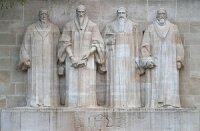 The Protestant Reformation was a movement that emerged in the 16th century as a series of attempts to reform the Roman Catholic Church in Western Europe. The main front of the reformation was started by Martin Luther and his 95 Theses. The reformation ended in division and the establishment of new institutions, most importantly Lutheranism, the Reformed churches, and Anabaptists, a radical branch whose name means "those who baptize again".
The Protestant Reformation was a movement that emerged in the 16th century as a series of attempts to reform the Roman Catholic Church in Western Europe. The main front of the reformation was started by Martin Luther and his 95 Theses. The reformation ended in division and the establishment of new institutions, most importantly Lutheranism, the Reformed churches, and Anabaptists, a radical branch whose name means "those who baptize again".It also led to the Counter-Reformation within the Roman Catholic Church, which theological draft and background were drawn up with the Council of Trent (1548–1563), when Rome struck back against the fundamental ideas defended by the Reformers, like Luther. The rift between Catholics and Protestants would lead to the break up of large European empires into the modern nation-state system.
Unrest in the Western Church and Empire culminating in the Avignon Papacy (1308–1378), and the papal schism (1378–1416), excited wars between princes, uprisings among the peasants, and widespread concern over corruption in the monastic system. A new nationalism also challenged the relatively internationalist medieval world.
One of the most disruptive and radical of the new perspectives came first from John Wycliffe at Oxford University, then from John Huss at the University of Prague. The Roman Catholic Church officially concluded this debate at the Council of Constance (1414–1418). The conclave condemned Jan Hus, who was executed (he had come under a promise of safe-conduct) and posthumously burned Wycliffe as a heretic.
More...


No comments:
Post a Comment